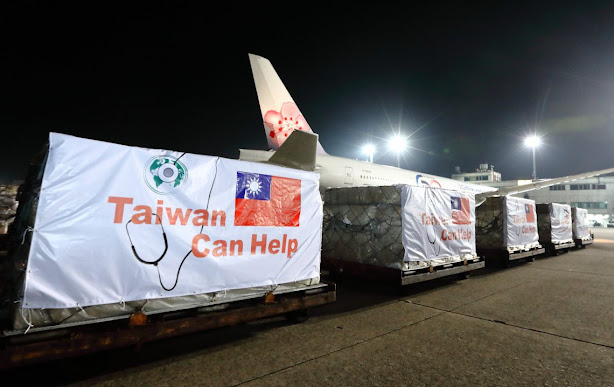Neutralising Covid-19 disinformation
News that matter in Papua New Guinea
Disinfection workers in Taipei's Wanhua District. - CNA photo May 12, 2021
Neutralising Covid-19 disinformation
PORT MORESBY: In Part 3B of our final instalment of our series on Taiwan’s experience in fighting the Coronavirus (Covid-19) pandemic, we look at how the Government executed measures to counter disinformation to neutralise the effects on the fight against the virus pandemic.
The earlier reports were these: https://pngcybermonitor.blogspot.com/2021/07/fighting-covid-19-taiwans-successful.html (Fighting Covid-19: Taiwan’s ‘successful’ experience)
https://pngcybermonitor.blogspot.com/2021/07/use-of-big-data-ai-to-curb-covid-19.html (Use of big data, AI to curb Covid-19)
https://pngcybermonitor.blogspot.com/2021/08/taiwans-ict-support-in-covid-19-battle.html (Taiwan’s ICT support in Covid-19 battle)
https://pngcybermonitor.blogspot.com/2021/08/vaccine-r-test-kits-vs-covid-19.html (Vaccine R&D, test kits vs Covid-19)
This is part 3B (Final):
Real-time responses providing rapid clarification, exposing disinformation:
Faced with the challenges posed by the Covid-19 outbreak, the Government is drawing on advanced prevention and containment technologies, using the most authoritative data available to prevent disinformation from confounding the public.
In addition to ensuring that its press conferences delivered accurate information on the pandemic, the CECC also monitored public opinion around the clock, attacking disinformation and strengthening public trust by responding to unfounded rumours through immediate clarifications.
Moreover, punitive clauses in Article 63 of the Communicable Disease Control Act and Article 14 of the Special Act on Covid-19 Prevention, Relief and Restoration promulgated in February 2020, defined the criminal responsibilities of those spreading disinformation on the pandemic, providing for jail sentences of up to three years and fines of up to NT$3 million.
All manner of disinformation had gone viral on the internet since the Covid-19 pandemic began. Some 200,000 instances were documented in February 2020 alone, an increase of 203 per cent. Even before Covid-19 was present in Taiwan, netizens were spreading the rumour that cases had already been confirmed in Taiwan. Later, rumors said that an unnamed hospital had implemented control measures because of a suspected Covid-19 case on its premises, and that patients were allowed to enter but not to leave.
After the Government placed controls on the production and supply of masks, online rumors started to spread that the Government was requisitioning masks in order to profit; other rumors said that toilet paper was going to run out.
There were even forged official documents and related disinformation. All of these examples highlighted attempts to cause social disquiet and exhaust the Government’s administrative resources.
Fortunately, the CECC’s press conferences, Government Facebook pages, and the LINE account served as major sources of up-to-date information, and the Government was able to clarify disinformation immediately, and shield the public from its impact.
Although citizens were now highly vigilant regarding disinformation on the pandemic, the Government still continued to investigate its sources, and found that a high proportion originated from overseas.
Investigations by the Justice Ministry’s Bureau of Investigation found the disinformation came from Weibo microblogging site, where posts swapped or altered stories on Taiwanese current affairs, commentary by political figures, and place names.
These posts found their way onto Facebook groups and other social media throughout China, Hong Kong, and Taiwan.
The Taiwan FactCheck Centre, an independent private institution, identified three features of disinformation:
1. THE source is unknown. For example: “My friend’s uncle said …”; “My friend in the Ministry of National Defense told me …”
2. THE presence of simplified Chinese characters or use of language more common to mainland China, such as xiaoqu to mean community and bao’an to mean security.
3. CONTENT that falsely claims Taiwan’s pandemic prevention efforts had become dysfunctional.
US health secretary Alex Azar praises Taiwan's Covid-19 response during rare high-level visit in 40 years, calling on Taiwan’s president Tsai Ing-wen. - Photograph: Taiwan presidential office/EPA
In addition, Facebook also found that Chinese netizens had directed disinformation on Covid-19 at Taiwan, and it thus deleted more than 60 accounts in early March 2020.
Most of these accounts had purported to represent Taiwanese people by using names written in traditional Chinese characters, but Facebook was able to distinguish their origin through such technical details as account creation date and IP address.
The accounts had intentionally spread rumors about the Government, mostly regarding Covid-19, with the apparent purpose of creating social unease and scapegoating the Taiwanese Government.
The times we live in have been characterised by a vast and almost overwhelming upsurge of information, so it is difficult to completely contain disinformation. However, the Government was providing open and transparent information on Covid-19, and actively and swiftly responding to and clarifying various kinds of disinformation.
This had effectively strengthened public trust in the Government, offsetting the impact of disinformation.
Taiwan’s experience with Covid-19, and aid to the Pacific
A staff wears a face mask with a Taiwanese flag design as protection from the Coronavirus (Covid-19) outbreak, at a factory for non-woven filter fabric used to make surgical face masks in Taoyuan. – Pic by REUTERS/Ann Wang






Comments
Post a Comment